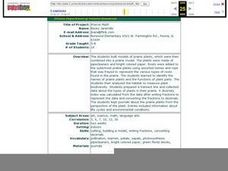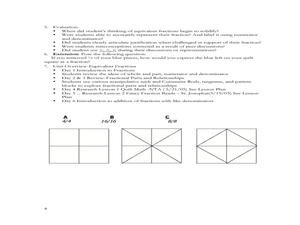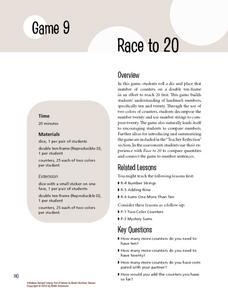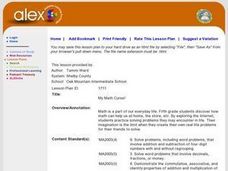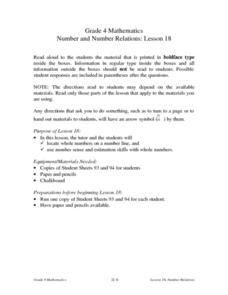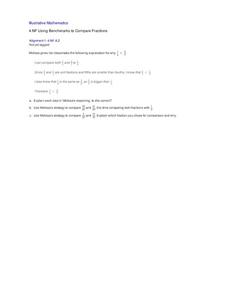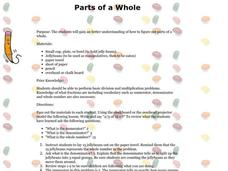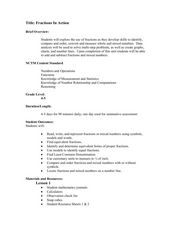Curated OER
Prairie Math
Students work together to build models of prairie plants. Using the model, they estimate the height and then measure them using metric and standard units. They write a fraction to represent their part of the whole set and compare and...
Illustrative Mathematics
Shape Hunt Part 1
The hunt is on! Send young mathematicians on a search for shapes in the first lesson of this two-part series. Each time a child finds a hidden shape, he draws it on his paper, and continues searching for the rest. Perform this activity...
Curated OER
Half Math Quilt
Help your third graders become familiar with equivalent fractions for one-half by having them create a quilt. They will use triangles to create a quilt of equivalent fractions over a period of 6 days. As they create the quilt pieces they...
Curated OER
The Divider (whole number remainders)
Third graders use the lesson to support division of whole numbers where there is either no remainder or whole number remainders. They are able to
slit division problems into parts using known multiplication and division facts.
Math Solutions
Race to 20
And they're off! Working in pairs, young mathematicians roll dice to see who can fill in their double ten-frames first. When students finally fill in their arrays, they create addition number sentences that represent their rolls, helping...
Curated OER
Fractions lesson 1
Young scholars are given an overview of fractions using fractions manipulatives. Students comprehend what numerators and denominators are. They demonstrate a clear comprehension that the size of a fraction depends on the number of parts...
Curated OER
Fractions
Students determine that a fraction is a part of a whole or part of a group. They write and read fractions and solve various fraction problems. They create their own fraction problem using colored candies for their classmate to solve.
Curated OER
Using Numbers Everywhere
Kindergarteners explore various representations and uses of numbers to develop number sense. They participate in an activity and arrange patterns into groups. Students compare the sets and describe the objects in each set.
Curated OER
Divide and Conquer
Seventh graders analyze responses to different types of problems. Using pictures and diagrams, they explore and model the division of fractions. Students examine situations that call for division whether with the whole numbers or with...
Curated OER
Number and Number Relations: Lesson 2
Fourth graders participate in using the terminology of more, less, between, compare, and order. They compare whole numbers and use the symbols for <, >, =. They order whole numbers and practice with problems where they use this...
Curated OER
Number and Number Relations: Lesson 3
Eighth graders compare whole numbers and decimals. They use symbols for <, >, =, and order whole numbers and decimals. They practice the meaning of positive and nugative integers by using them to describe real-world situations.
Curated OER
Little Mouse, the Red Ripe Strawberry and Big Hungry Bear Lesson Plan
Students create a fruit salad using pieces of fruit cut in halves. In this early childhood lesson plan, students discover the concept of half and whole. Students experience this concept in a hands-on activity in which they cut fruit...
Curated OER
My Math Curse!
Math novices examine how math can help them in real-world situations. They listen to the book The Math Curse by Jon Scieszka, solve various word problems from the book, explore various math websites, write original math word problems,...
West Contra Costa Unified School District
Simplifying Fractions Activity
Warm-up pupils' fraction muscles with a four-question quiz, then delve into a learning game designed to reinforce the concept of simplifying fractions. Based on the "I do, We do, You do" method of teaching, the lesson directly...
Curated OER
Number and Number Relations
Upper graders multiply numbers by tens and hundreds, and multiply two and three digit numbers by one digit numbers. They participate in a teacher-led lecture and complete examples with the class, complete a worksheet, and discuss the...
EngageNY
Construct an Equilateral Triangle (part 1)
Drawing circles isn't the only thing compasses are good for. In this first installment of a 36-part series, high schoolers learn how to draw equilateral triangles by investigating real-world situations, such as finding the location of a...
Illustrative Mathematics
Using Benchmarks to Compare Fractions
Introduce a new strategy for comparing fractions by analyzing Melissa's use of benchmarks. Walk the class through her process, calling on students to explain their understanding of each step she took. Then practice this method on two...
Curated OER
The Whole is More Than Half
Students explore number sense by completing a food related fraction activity. In this parts of a whole lesson, students utilize a graham cracker to divide and identify what a quarter, third, or half looks like. Students eat their snack...
Curated OER
Part-Part-Whole
In this mathematics worksheet, students identify a whole number as a combination of two smaller parts. They use counters to help them add various combinations of numbers.
Curated OER
Parts of a Whole
Students gain an better understanding of how to figure out parts of a whole.
Curated OER
Parts of a Whole
Pupils recognize coins are worth a fraction of a dollar. They represent the value of different coins by shading in their equivalent fractional parts in the circle. They understand that fractions are part of a whole.
Curated OER
Fractions in Action
Investigate equivalent fractions with your class. They compare and order fractions. Then they work cooperatively in groups to experiment and problem solve with fractions using a game format. Multiple resources are provided.
EngageNY
Percent of a Quantity
Visualize methods of finding percents. Classmates find a percent of a quantity using two methods including a visual model in the 26th lesson in a series of 29. By the end of the lesson, scholars find percents given a part and the whole...
Curated OER
Comparing Apples With Apples 1
Elementary schoolers observe and demonstrate how to add and subtract fractions with like denominators. They observe the teacher model a variety of fraction addition and subtraction problems and use fraction strips to complete a worksheet.
